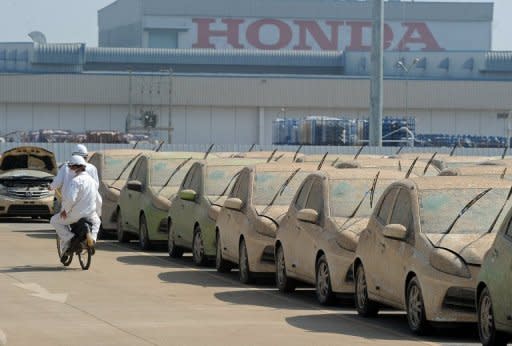Japan posts weaker than expected factory output growth
Japan has posted anaemic factory output growth of 0.2 percent in April, slower than expected and raising concerns about a recovery for the world's third-largest economy. The economy, trade and industry ministry put a positive gloss on its latest figures, saying output "continues to show an upward movement", while the government and Bank of Japan have both maintained in recent months that growth is on a positive track. The ministry also pointed to a manufacturers' survey on Thursday showing that, while factory managers expected a 3.2 percent on-month dip in output in May, it would be followed by a 2.4 percent rise in production in June. RBS Securities chief Japan economist Junko Nishioka was less convinced, saying output has "hit the ceiling" due to excess inventories in some sectors, including the vehicle and communication equipment industries. Nishioka said the economy was likely to mount a firm recovery later this year, but echoed policymakers' concerns over Europe's fiscal crisis hurting exports and pushing the yen higher, as worries increase over China's growth. Fears about summer power shortages also loom large for Japan's factories after the country switched off the last of its nuclear reactors earlier this month in the wake of last year's atomic crisis. The factory manager forecasts suggest that production "would be very volatile due to the combination of expected domestic economic recovery and sluggish export demand", said Credit Agricole economist Yoshiro Sato. The slight rise in April output was below the market's forecast of a 0.5 percent boost, according to Dow Jones Newswires, after revised data for March showed growth of 1.3 percent. There has been growing optimism that Japan's economy would rebound in 2012, after it was pounded by the quake-tsunami disaster in March 2011 and severe flooding in Thailand later in the year. The floods disrupted global supply chains and the production capability of Japanese manufacturers with plants in the Southeast Asian nation, particularly in electronics and automobiles. Earlier this month, official data showed that Japan's economy grew by a faster-than-expected 1.0 percent in the three months to March, driven by rising domestic demand, heavy reconstruction spending and a boost in exports. Data showing household spending on the rise offered further hope, although Japan's unemployment rate increased slightly in April to 4.6 percent from 4.5 percent in March, owing mainly to cuts in the struggling electronics sector. The news also came as reports said electronics giant Panasonic may halve its 7,000-strong Osaka headquarters as part of a bid to streamline itself and turn a profit following a record $9.7 billion annual loss. Energy shortages this summer could pose a serious risk to any recovery, with Tokyo calling for energy conservation as the country remains dependent on more expensive fossil fuel alternatives to nuclear to keep the lights on. Concern about Europe's fiscal problems has also taken a bite out of the euro, with the yen increasingly seen as a safe-haven unit. A strong currency hurts Japan's exporters by making their products relatively more expensive overseas while shrinking their foreign-earned income. Financial authorities have vowed possible further currency market interventions to bring down the value of the surging yen, which last year hit historic highs against the dollar.




